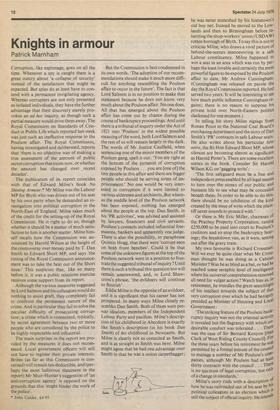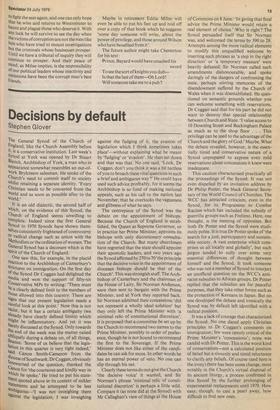Knights in armour
Patrick Marnham
Corruption, like espionage, goes on all the time. Whenever a spy is caught there is a great outcry about 'a collapse of security' instead of the satisfaction that might be expected. But spies do at least have to contend with a permanent invigilating agency. Whereas corrupters are not only presented as isolated individuals, they have the further advantage that their discovery merely provokes an ad hoc inquiry, as though such a partial measure would drive them away. The Royal Commission on Standards of Conduct in Public Life which reported last week was just such an ineffective response to the Poulson affair. The Royal Commission, having investigated and deliberated, reports that 'there is no objective way of making a true assessment of the amount of public sector corruption that exists now, or whether the amount has changed over recent decades'.
The publication of its report coincides with that of Edward Milne's book No Shining Armour.* Mr Milne was the Labour MP for Blyth who was driven out of his seat by his own party when he demanded an investigation into political corruption in the North-East of England. Milne takes much of the credit for the setting-up of the Royal Commission. He is right to do so, though whether it should be a matter of much satisfaction to him is another matter. Milne himself recalls how the Commission was announced by Harold Wilson at the height of the controversy over money paid by T. Dan Smith to Edward Short MP, and says 'the timing of the Royal Commission announcement was to take the heat out of the Short issue.' This suspicion that, like so many before it, it was a public relations exercise receives some support from its report.
Although the various measures suggested by Lord Salmon and his colleagues would do nothing to assist graft, they completely fail to confront the permanent nature of the crime. And in particular they fail to solve the peculiar difficulty of prosecuting corruption; a crime which is committed, typically, by secret agreement between two or more people who are considered by the police to be highly respectable and influential.
The main surprises in the report are provided by the measures it does not recommend. Local government officers will still not have to register their private interests. Bribes (as far as this Commission is concerned) will remain tax-deductible, and (perhaps the most ludicrous statement in the report) Mr Muir-Hunter's suggestion of 'an anti-corruption agency' is opposed on the grounds that this 'might hinder the work of the police'.
* John Calder, 4.95
But the Commission is best condemned in its own words. 'The adoption of our recommendations should make it much more difficult for anything resembling the Poulson affair to occur in the future'. The fact is that Lord Salmon is in no position to make that statement because he does not know very much about the Poulson affair. No one does. All that has emerged about the Poulson affair has come out by chance during the course of bankruptcy proceedings. And until there is a tribunal of inquiry under the Act of 1921 into 'Poulson' in the widest possible meaning of the word, both Lord Salmon and the rest of us will remain largely in the dark. The words of Mr Justice Caulfield, when sentencing one of the minor members of the Poulson gang, spell it out : 'You are right at the bottom of the pyramid of corruption exposed by Poulson . .. you are [one of] the tiny people in this affair and there are bigger people who should be serving terms of imprisonment.' No one would be very interested in corruption if it were limited to various aldermen and architects_But whereas the middle level of the Poulson network has been exposed, nothing has emerged about the people at the top. Dan Smith, in his 'PR activities', was advised and assisted by lawyers, financiers and civil servants. Poulson's contacts included influential freemasons, bankers and apparently one judge. There is also the possibility, to paraphrase Quintin Hogg, that there were 'corrupt men on both front benches'. Could it be that some of the unknown figures at the top of the Poulson network were in a position to frustrate the suggested tribunal of inquiry ? Until there is such a tribunal this question too will remain unanswered, and, in Lord Shawcross's phrase, 'the evildoers will continue to flourish'.
Eddie Milne is the opposite of an evildoer, and it is significant that his career has not prospered. In many ways Milne closely resembles Dan Smith. Both of them were prewar idealists, members of the Independent Labour Party and pacifists. Milne's description of his childhood in Aberdeen is exactly like Smith's description (in his book Dan Smith) of his childhood in Newcastle. But Milne is clearly not as conceited as Smith, and is as straight as Smith was bent. Milne might agree that he had one advantage over Smith in that he was a union carpetbagger; he was never enmeshed by his hometown's old boy net. Instead he moved to the Lowlands and then to Birmingham before inheriting the shop-workers' union (USDAW) rotten borough of Blyth. To say this is not to criticise Milne, who draws a vivid picture of behind-the-scenes manoeuvring in a safe Labour constituency. Milne happened to win a seat in an area which was run by perhaps the least lovable and certainly the most powerful figure to be exposed by the Poulson affair to date, Mr Andrew Cunningham. (Cunningham was released on parole the day the Royal Commission reported. He had served two years. It will be interesting to see how much public influence Cunningham regains; there is no reason to suppose his private hold over North-Eastern politics slackened for one moment.) In telling his story Milne zigzags frorn Ronan Point to the National Coal Board's purchasing department and the story of Dan Smith's 'PR' contracts in safe Labour seats. He also writes about his particular bete noire, the Rt Hon Edward Short MP, whose silences are becoming almost as significant as Harold Pinter's. There are some excellent scenes in the book. Consider Sir Harold Wilson KG on 'gagging writs':
'The first safeguard must be a free and independent press enabled by all legal means to turn over the stones of our public and business life to see what may be concealed benath them. In order to be able to do this, there should be no inhibition of the kind created by the issue of writs which the plaintiff never intends to proceed with.'
Or there is Mr Eric Miller, chairman of the Peachey Property Corporation, raising £250,000 to be paid into court to Poulson's creditors and so stop the bankruptcy hearings; the breakdown van, as it were, setting out after the gravy train.
My own favourite is Richard Crossman. Will we ever be quite clear what Mr Crossman thought he was doing as a Cabinet Minister? Was he as blind as a bat, or had he reached some seraphic level of intelligence where his universal comprehension removed all need for vulgar action ? Watch him as, in retirement, he trundles the great searchlight of his intellect towards the subject of that very corruption over which he had benignlY presided as Minister of Housing and Local Government : 'The striking feature of the Poulson banlrruptcy inquiry was not the criminal activity it revealed but the flagrancy with which undesirable conduct was tolerated . . . There was the case of Sir Bernard Kenyon [then Clerk of West Riding County Council]. for the three years before his retirement he wa.s, permitted by a formal minute of the council to manage a number of Mr Poulson's Coolpanies, although Mr Poulson had at least
thirty contracts with the council . . . There is no question of legal corruption, but onlY of a change in standards.'
Milne's story ends with a description of how he was railroaded out of his seat by h,is political colleagues in an election which 15 still the subject of official inquiry. He intends
to fight the seat again, and one can only hope that he wins and returns to Westminster to haunt and plague those who deserve it. With any luck he will survive to see the day when the victims of corruption are not the men like him who have tried to mount investigations but the criminals whose businesses prosper. Until we have a tribunal of inquiry they will continue to prosper. And their peace of mind, as Milne implies, is the responsibility of our political leaders whose inactivity and omissions have been the corrupt man's best friends. Maybe in retirement Eddie Milne will even be able to put his feet up and nod off over a copy of that book which he suggests 'some day someone will write, about the power of privilege, and those around Wilson who have benefited from it'.
The future author might take Chesterton for his text :
Prince, Bayard would have smashed his sword To see the sort of knights you dub—
Is that the last of them—Oh Lord !
Will someone take me to a pub ?



































 Previous page
Previous page